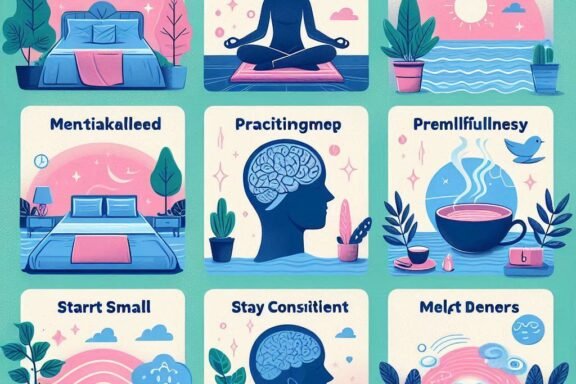Your Life, Your Health: 10 Simple Steps for Healthy Living
In a world that constantly demands more from us—more work, more stress, and more responsibilities—it’s easy to forget the most important thing: our health. But taking care of yourself doesn’t have to mean drastic changes or overwhelming commitments. Sometimes, small steps can lead to big improvements in your overall well-being.
Health is not just about avoiding sickness; it’s about feeling good, both mentally and physically. And the best part is, you don’t need to completely overhaul your lifestyle to start feeling better. In this blog, we’ll discuss 10 simple steps for healthy living that can easily fit into your daily routine. Let’s begin!
1. Start Your Day with Hydration
The first thing you should do when you wake up in the morning is drink a glass of water. Overnight, your body loses moisture, and a glass of water helps jump-start your metabolism, hydrate your cells, and flush out toxins. Try adding a slice of lemon to your water for an extra boost of vitamin C. You’ll not only feel more awake but also improve digestion and boost your immune system.
Many people underestimate the importance of hydration, but it’s a simple, yet powerful habit. If you’re someone who struggles to drink water throughout the day, make it a goal to start every morning with a big glass. It’s a habit that sets a healthy tone for the rest of the day.
2. Move Your Body Every Day
You don’t need to be at the gym for hours to stay fit. The key is consistency. Aim to move your body every day—whether it’s a brisk walk, yoga, or a 20-minute home workout. Physical activity doesn’t just keep your body in shape; it also releases endorphins, which can help reduce stress and improve your mood.
If you’re short on time, consider simple movements like stretching in the morning or walking after meals. The important thing is to find a form of exercise you enjoy so it becomes a sustainable habit.
3. Eat More Whole Foods
What you eat directly affects how you feel. A diet rich in whole, unprocessed foods—fruits, vegetables, whole grains, and lean proteins—will give your body the nutrients it needs to perform at its best. Foods like leafy greens, berries, nuts, and seeds contain powerful antioxidants that help fight inflammation and support overall health.
Start by making small adjustments to your meals. Try swapping refined carbs for whole grains, or incorporate more vegetables into your meals. The goal is to fuel your body with natural, nutrient-dense foods that provide long-lasting energy and keep you feeling full without the sugar crashes.
4. Prioritize Sleep
Sleep is essential for both physical and mental well-being. It’s during sleep that your body heals, your brain consolidates memories, and your immune system strengthens. Unfortunately, many of us sacrifice sleep to meet deadlines or binge-watch shows, but this can lead to burnout and long-term health problems.
Aim for 7-9 hours of quality sleep each night. Create a bedtime routine to help signal to your body that it’s time to wind down—this could include turning off electronic devices, dimming the lights, and engaging in relaxing activities like reading or meditating. When you prioritize sleep, you’ll wake up feeling refreshed, focused, and ready to take on the day.
5. Manage Stress with Mindfulness
Stress is an inevitable part of life, but how you handle it can make a big difference. Practicing mindfulness—whether through meditation, deep breathing, or simply being present in the moment—can significantly reduce stress levels and improve your overall mental health.
Start with just five minutes a day of mindful breathing. Sit quietly, close your eyes, and focus on your breath as it enters and leaves your body. When your mind starts to wander, gently bring your attention back to your breath. Over time, this simple practice can help calm your nervous system, improve concentration, and even boost your mood.
6. Stay Socially Connected
Social connections are vital for mental and emotional health. Loneliness can lead to feelings of sadness, anxiety, and even physical health problems. Make time to connect with family, friends, or colleagues. Whether it’s through a phone call, a text, or a quick coffee catch-up, these interactions nourish your emotional well-being and provide a sense of belonging.
Even if you’re introverted, find ways to engage with others. Human connection doesn’t have to be overwhelming; it’s the quality of your interactions, not the quantity, that matters.
7. Practice Gratitude
A daily gratitude practice can shift your mindset from what’s lacking in your life to what’s abundant. It’s easy to get caught up in the hustle of daily life and focus on problems, but practicing gratitude helps you appreciate the good things, big and small, in your life.
Start by keeping a gratitude journal. Every night before bed, write down three things you’re grateful for. They can be as simple as a cup of coffee or a good conversation. By focusing on the positive, you’ll boost your mental health and enhance your overall outlook on life.
8. Set Boundaries and Say No
In today’s world, we’re often overcommitted, trying to juggle work, social obligations, and family responsibilities. But one of the simplest ways to protect your mental and physical health is by setting boundaries and learning to say no.
When you prioritize your own needs and time, you’re able to give your best self to the people and tasks that truly matter. Saying no doesn’t mean you’re selfish—it means you’re respecting your own limits and ensuring that your energy is used wisely. Don’t be afraid to turn down extra work or social commitments that you don’t have the capacity for.
9. Engage in Mental Stimulation
Just like physical exercise, your brain needs stimulation to stay sharp. Reading, learning a new skill, solving puzzles, or even playing strategy games can help keep your brain active and improve cognitive function. Mental exercise is an important part of healthy aging, and it can boost your mood and confidence, too.
Make time for activities that challenge your mind. Whether it’s reading a book, taking an online course, or trying a new hobby, keeping your mind engaged is essential for long-term mental health.
10. Practice Self-Care Regularly
Self-care isn’t just about pampering yourself—it’s about prioritizing your own well-being and taking time to recharge. This can mean different things for different people. For some, it might be taking a bubble bath; for others, it might be journaling or enjoying a quiet walk in nature.
Whatever makes you feel relaxed and rejuvenated, make it a regular part of your routine. A little self-care goes a long way in helping you maintain balance and avoid burnout.
Conclusion
Healthy living doesn’t require perfection, and it certainly doesn’t require drastic changes. By incorporating just a few of these simple steps into your daily routine, you can improve your overall health and well-being. The key is to start small, stay consistent, and listen to your body’s needs.
Your life, your health—take charge of it today, and your future self will thank you. These simple, actionable steps can help you feel more energized, balanced, and happy, and in the end, that’s what healthy living is all about.
Start with one step today, and remember: Every small choice adds up to a healthier, happier you.







No Comments